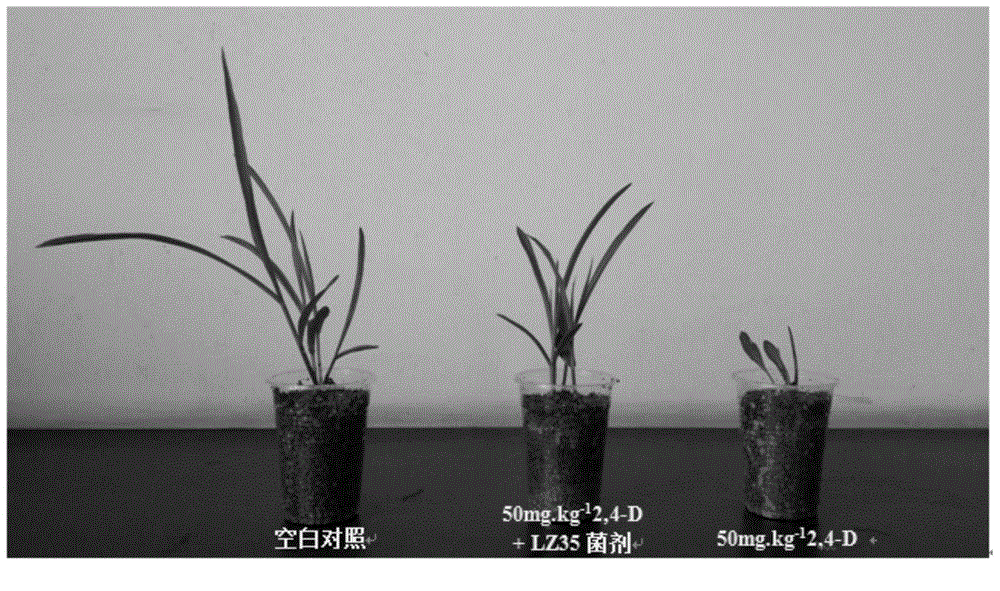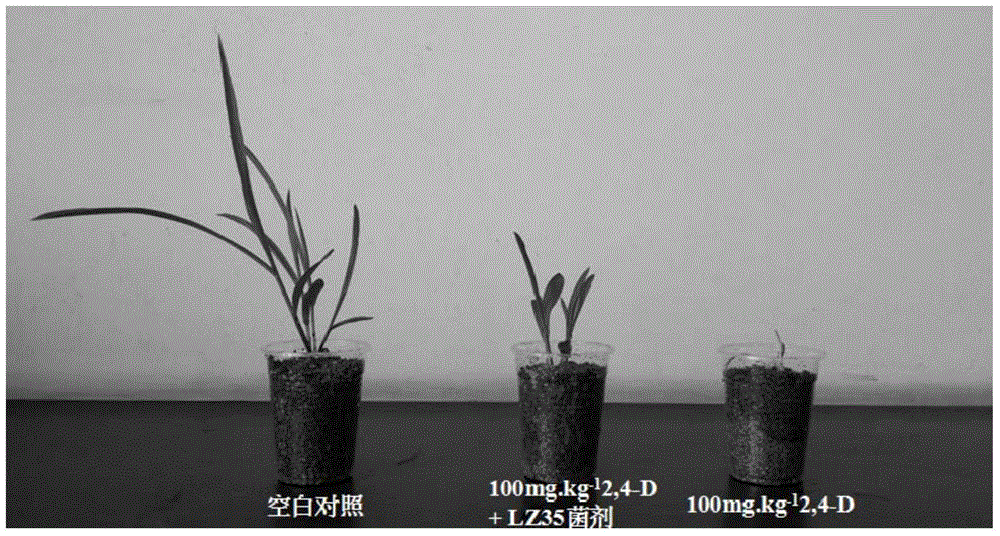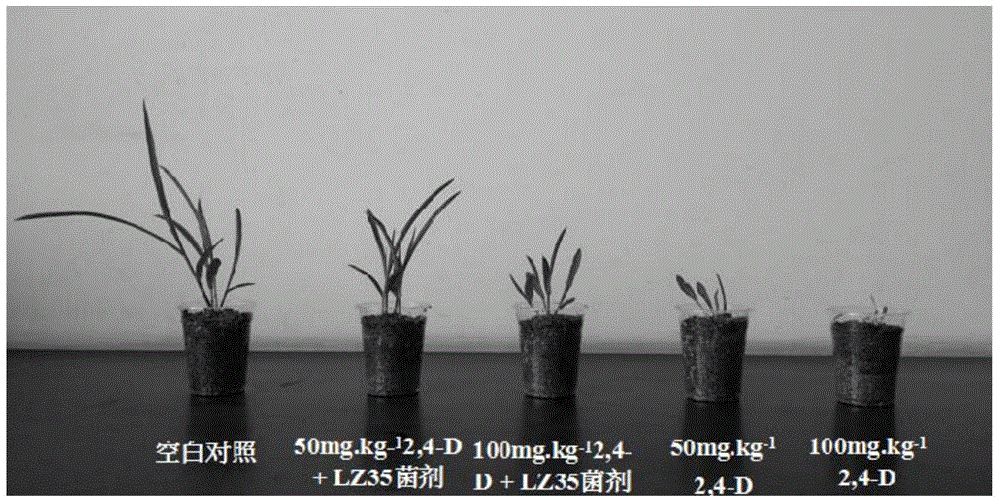Degradation strain of herbicide 2, 4-D, produced inoculum and application thereof
A herbicide, 4-D technology, applied in the field of microorganisms, can solve the problems of crop damage economy, impact on food safety, strong adsorption and other problems, so as to solve the phytotoxicity of next crops and relieve the phytotoxicity of subsequent crops , the effect of strong resistance
- Summary
- Abstract
- Description
- Claims
- Application Information
AI Technical Summary
Problems solved by technology
Method used
Image
Examples
Embodiment 1
[0032] The invention provides a bacterial strain capable of efficiently degrading (mineralizing) 2,4-D and the bacterial agent produced therefrom. The bacterial strain used is Gram-negative bacteria LZ35, which is isolated from the soil of the Lvlilai Pesticide Factory in Kunshan, Jiangsu. . The specific isolation and screening method of the strain is as follows: take 5.0g of soil sample and add it to 100ml of inorganic salt liquid medium with 0.1% yeast powder added, add 2,4‐D to a final concentration of 50ppm, and carry out enrichment culture at 30°C. Shaker speed is 150rpm·min ‐1 , inoculated into fresh inorganic salt liquid medium with 10% inoculation amount every 7 days, and subcultured continuously for 3 times. Then inoculate 1% of the inoculum into fresh 20ml inorganic salt liquid medium with 2,4‐D final concentration of 50ppm, and culture for 5 days. The content of 2,4‐D was detected simultaneously by UV scanner and liquid chromatography, and it was found that 2,4‐D ...
Embodiment 2
[0040] Activate the original seed of the 2,4-D herbicide-degrading strain LZ35 of the present invention on a petri dish, measure its degradation performance, and inoculate it on the inclined surface of a test tube for later use. The test tube seed is inoculated in a 1000ml shaker flask containing 200ml of broth medium (3 grams of beef extract, 10 grams of peptone, 5 grams of NaCl, 1000 ml of water, pH 7.0-7.2), constant temperature shaking culture to logarithmic phase, ready to inoculate seeds Can. 500 liters of seed tanks, 400 liters of feeding capacity, the medium formula is: glucose 0.8%, (NH 4 ) 2 SO 4 1%, K 2 HPO 4 0.2%, MgSO 4 0.05%, NaCl 0.01%, CaCO 3 0.3%, yeast extract 0.02%, pH 7.2-7.5. After the feeding is completed, 121°C high-pressure damp heat sterilization, after cooling to 33°C, inoculate the above-mentioned cultivated shake flask strains into a 500-liter seed tank according to the inoculum amount of 10%, and cultivate to the logarithmic growth phase, an...
Embodiment 3
[0042] Activate the original seed of the 2,4-D herbicide-degrading strain LZ35 of the present invention on a petri dish, measure its degradation performance, and inoculate it on the inclined surface of a test tube for later use. The test tube seed was inoculated in a 1000ml shake flask containing 500ml broth medium (3 grams of beef extract, 10 grams of peptone, 5 grams of NaCl, 1000 milliliters of water, pH 7.0-7.2), and cultured with constant temperature shaking until the logarithmic phase. The bacteria were collected by centrifugation, and the bacteria were resuspended in sterile water. Then take the fresh test soil, add 2,4‐D aqueous solution, mix well, so that the concentration of 2,4‐D in the soil is 50 mg kg ‐1 and 100mg·kg ‐1 dry soil. At the same time, the treatment group was inoculated with fresh LZ35 strain suspension in the soil, and the blank control group was added with sterile water, which was also stirred evenly. The mixed soil is divided into disposable plas...
PUM
 Login to View More
Login to View More Abstract
Description
Claims
Application Information
 Login to View More
Login to View More - R&D
- Intellectual Property
- Life Sciences
- Materials
- Tech Scout
- Unparalleled Data Quality
- Higher Quality Content
- 60% Fewer Hallucinations
Browse by: Latest US Patents, China's latest patents, Technical Efficacy Thesaurus, Application Domain, Technology Topic, Popular Technical Reports.
© 2025 PatSnap. All rights reserved.Legal|Privacy policy|Modern Slavery Act Transparency Statement|Sitemap|About US| Contact US: help@patsnap.com



